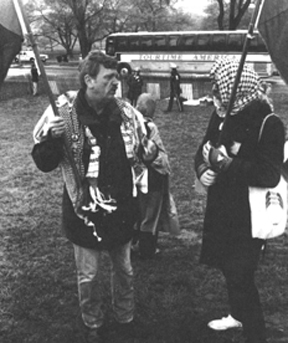The Zionist Terror Network
|
||||||||||||||||||||||||||||||||||||||||
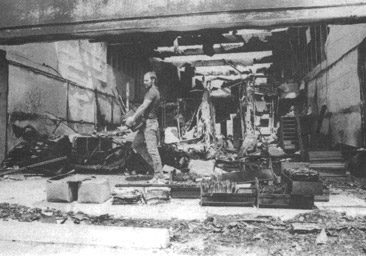 |
| Thomas Marcellus, Director of the Institute for Historical Review, sorts damaged files from the wreckage of the devastating arson attack on July 4, 1984, against the southern California research and publication center. |
Zionist terrorists openly proclaim an arrogant Jewish-supremacist ideology and acknowledge their readiness to use violence against those who disagree with them. With a well-documented record of bigotry and crime, they pose a serious danger to our society, and to men and women everywhere who treasure freedom.
Meir Kahane and the Jewish Defense League
The most zealous non-governmental Zionist terrorist organization has been the Jewish Defense League. Its activists have been involved in a wide range of crimes, and the US Federal Bureau of Investigation has repeatedly cited it as a criminal terrorist group.
The Jewish Defense League was founded in 1968 by Rabbi Meir Kahane. Born Martin David Kahane in 1932 in Brooklyn, New York, he was the first-born son of an orthodox rabbi who was active in the "revisionist" movement of Zionist hard-liner Ze'ev Jabotinsky. Jabotinsky and other leaders of his movement were guests at the Kahane household while Martin (Meir) was a boy. As a youth, Kahane became an active member of the Jewish-supremacist Betar movement, which Jabotinsky had founded in 1925. Kahane's first arrest came in 1947, when he was fifteen, for leading a group of Betar youth in an attack against visiting British foreign minister Ernest Bevin. (note 1)
Two of Jabotinsky's most fervent followers went on to gain notoriety as leaders of Zionist terror groups, and, later, as prime ministers of Israel: Menachem Begin, who once headed the Irgun group, and Yitzhak Shamir, who headed the Lehi group (Stern gang). Shamir, for example, played a crucial role in the Lehi murder in November 1944 of British Middle East envoy Lord Moyne, and in the September 1948 assassination of Swedish United Nations peace mediator Count Folke-Bernadotte. (note 2)
For a time in the 1960s, Kahane led a double life. He lived and worked under the name of Michael King, keeping this identity secret even from his wife. During this period, he later related, he worked for the Central Intelligence Agency and for the Federal Bureau of Investigation. For the FBI he spied on the right-wing John Birch Society as well as on various left-wing student groups. (note 3)
Posing as the non-Jewish Michael King, he had affairs with a number of young women he picked up in New York bars. One of them was Gloria Jean D'Argenio, a (non-Jewish) 22-year-old model who worked under the name of Estelle Evans. After their meeting in 1966, they promptly began an affair. Never revealing his true identity, he even proposed marriage. After Kahane/King broke off the relationship a few weeks later, she attempted suicide by hurling herself into the East River, dying two days later (on Kahane's 34th birthday). (note 4)
Kahane's life changed dramatically in 1968, when he and several colleagues founded the Jewish Defense League. Brandishing guns and provocative slogans ("Every Jew a .22," "Never Again"), Kahane's JDL quickly attracted considerable media attention. Kahane pointedly exploited rising anti-black sentiment among Jews in the New York area. (note 5)
Kahane and his new organization received important and probably crucial support from two powerful allies: Israel's right-wing Herut political party and the New York Mafia.
Between December 1969 and August 1972, Kahane's JDL -- with important support and guidance from Menachem Begin's Herut party in Israel, top officers of Israel's Mossad secret service, and several wealthy American Jewish businessmen -- carried out a campaign of criminal attacks against Soviet Russian diplomats and other Soviet targets in the USA. The goal was to focus attention on and generate sympathy for Soviet Jewry, and to damage relations between the United States and Soviet Russia. (note 6)
On May 12, 1971, Kahane and a dozen other JDL members were arrested by federal agents for conspiracy to manufacture explosives. One day later, Kahane announced an alliance with a group founded by Mafia boss Joseph Colombo, Jr., a one-time killer who had risen to head the Colombo crime syndicate. "Kahane received substantial aid from the New York Mafia," writes Israeli journalist Yair Kotler in his biography of the JDL founder. Until Colombo's murder in 1971, relations between Kahane and the New York City mob boss were very close, and the two criminal chiefs worked closely together. (note 7)
Kahane claimed to have spent a total of three years in American prisons as a result of his militant activities. (note 8) During the early 1970s, Kahane abandoned the JDL and moved to Israel -- returning on occasional visits to raise money. Building on the international notoriety he had gained as JDL leader, in 1976 he launched his radical Kach party. In 1984 he was elected to the Israeli Knesset (parliament) as his party's only deputy. Meanwhile, the JDL's New York chapter collapsed, and splinter groups emerged with names such as the "Jewish Direct Action," the "United Jewish Underground," "Save Our Israel Land," and the "Jewish Defenders." (note 9)
Kahane was assassinated on November 5, 1990, while addressing a meeting of supporters at a hotel in midtown Manhattan, New York City. (note 10)
Rabbi Kahane's Ideology
In numerous speeches and essays, and in several books, Meir Kahane preached an arrogant and even genocidal message of Jewish supremacy and ruthless Zionism. For the JDL leader and his many fervent followers, any and all measures to further Jewish survival and welfare -- including terror, dispossession and murder -- are entirely justified. (note 11)
Typical of his passionate and outspoken prose style is a representative essay by Kahane that appeared in 1980 in a leading Jewish community paper. He wrote: (note 12)
...Vengeance is a fundamental Jewish concept that is a precept, injunction, commandment for the Jew...Vengeance becomes, thanks to the gentilized and perplexed era in which we live, a maligned thing...Let the government of Israel, which is responsible for the lives of its citizens, make the streets, buses, shops and homes of the Ishmaelites [Palestinians] perpetual places of terror and stark insecurity...Wipe away the bitter degradation of God's name that is symbolized by Arab refusal to bow to Jewish sovereignty. A truly Jewish government is one that understands the need to...burn out the desecration by removing, burning out, the evil that is the Arab nation in our midst.
In another essay, this one published in 1973, Ka-hane emphasized Jewish invincibility. The day will come, he promised, when all non-Jews would acknowledge the superiority of the Chosen people: (note 13)
The Jewish people cannot ever be destroyed, but rather they and their G-d of History will emerge in days to come triumphant over the evils and foolishness of all other nations. Zion will and must emerge as the mount to which all peoples will turn and the Jewish L-rd will be the One before Whom all knees bend...
In an essay published in 1982, Kahane stressed the pitiless, either-or, us-or-them, nature of the struggle between Jews and their "enemies": (note 14)
Let us look at events through Jewish eyes...Lebanon:...A war was begun [by Israel] against a "Palestinian" enemy -- an entire people -- which seeks to wipe out the Jewish state and the vast majority of its Jews. It was...a war unto the death, the utter destruction of the enemy, the instilling of total fear, terror, until he capitulates and acknowledges the L-rd.
Jewish and liberal democratic values are incompatible, Kahane often insisted: "I have said it a million times. Western democracy as we know it is incompatible with Zionism...The idea of a democratic Jewish state is nonsense." (note 15) On another occasion he stated: "Democracy is for people who don't have the truth. No earthly, temporal government has any relevance to the actions of the Jew when its orders and regulations are contrary to [Jewish] Torah law...Judaism has never been a democratic form of society." (note 16)
A virtual obsession for Kahane was the brutal wartime treatment of Europe's Jews. "Never Again," the JDL slogan, pointedly referred to the Holocaust experience. In Kahane's view, every non-Jew is a potential Nazi murderer. "As long as one gentile lives opposite one Jew, the possibility of a Holocaust remains," he wrote. (note 17) The moral measure of every action, Kahane stressed, must be "is it good for the Jews?" Failure to act in accordance with this principle, he emphasized, will lead to "a new Auschwitz." (note 18)
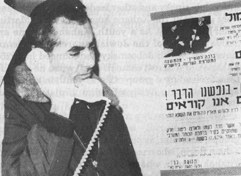 |
| Meir Kahane in 1979 at his headquarters in Jerusalem, the "Musuem of the Potential Holocaust." (Photo from The False Prophet by Robert Friedman) |
In his biography of Kahane, author Robert Friedman relates some of the quirkiness of the militant rabbi's personality. Recalling his first meeting with him at his "Museum of the Potential Holocaust" in Jerusalem, Friedman wrote: "It struck me on that first encounter that Kahane was a man obsessed with sex and violence. He chattered incessantly about Arab men sleeping with Jewish women." (note 19)
Kahane publicly called Arabs "dogs," (note 20) and on at least one occasion promised to eliminate Arabs from Israel "like bug spray on these cockroaches." (note 21) In numerous speeches, and in a 1980 book entitled They Must Go, Kahane outlined his plan for the forcible mass expulsion (or "transfer") of Palestinian Arabs from the "Land of Israel" -- that is, "greater Israel" (including the West Bank territory seized by Israel in 1967).
Kahane's worldview was summed up in the "statement of principles" of the Kach movement, which he founded and headed. It begins with an arrogant description of "the Jewish People" as "special, chosen, holy and supreme." (note 22) A primary Kach goal is
the transfer of the Arabs from all parts of Eretz Israel [the enlarged "Land of Israel"]. The Arabs' presence in Israel ensures hatred, disturbances, and bloodshed. It is a time bomb, threatening the existence of the Zionist enterprise. The Arabs living in Eretz Israel must therefore be transferred to the Arab countries.
Kahane and his supporters agitated for an Israeli law that would criminalize sexual relations between Jews and non-Jews. (At it is, Jews were already forbidden from marrying non-Jews in Israel.) The proposed law would also outlaw a broad range of social contacts between Jews and non-Jews, including mixed schools, community centers, beaches, and even neighborhoods. (note 23)
Kahane and his sympathizers have never been particularly bothered by the parallels between his proposed law and Hitler's "Nuremberg Laws" of 1935, which similarly banned sexual relations between Jews and non-Jews. (note 24)
As Kahane and other hardline Zionists have persistently pointed out, Jewish religious law clearly forbids Jews to marry non-Jews. (note 25) Similarly, Ka-hane never tired of citing Jewish religious scripture in support of his ruthless, uncompromising message. As American Jewish author Lenni Brenner has acknowledged, Kahane and his supporters are (note 26)
absolutely correct in insisting that Judaism was a tribal religion, replete with hereditary priests performing animal sacrifices. It was genocidal to the Amalekites, and tried to do so toward the Canaanites. There was much else that was fanatic and racist.
Support for Kahane and the JDL
Few prominent Israeli or American Jewish community leaders were ever willing publicly to support Kahane, and major American Jewish organizations -- such as the American Jewish Committee, the Anti-Defamation League of B'nai B'rith, and the American Jewish Congress -- took care to disavow Kahane and the JDL. At the same time, though -- and in spite of his well-documented criminal record and his message of undisguised bigotry and arrogance -- Kahane and the JDL enjoyed sympathy and considerable support from a surprisingly broad cross-section of American Jewry. Over the years, American Jewish businessmen gave millions of dollars to Kahane. (note 27)
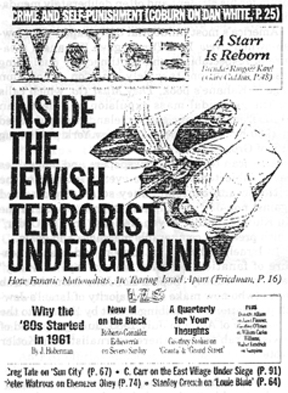 |
| Zionist terrorism is the subject of a front-cover feature article in the New York weekly Village Voice, November 12, 1985. |
At the conclusion of an address given in 1971 at a prosperous synagogue in Potomac, Maryland, during which the JDL leader praised the fire-bombing of a car, the well-to-do congregation gave Kahane a standing ovation. (note 28) Jackie Mason, a prominent American comedian, publicly supported Kahane and performed at a fund-raising benefit for the JDL in early 1972. "Democratic principles shouldn't apply to Israel like they do to America," explained Mason (like Kahane, an ordained Rabbi). (note 29) At a single fundraiser dinner in Boston in 1986, more than $20,000 was reportedly collected for Kahane. (note 30)
An indication of Kahane's acceptance by even major American political figures came in 1972, when the JDL leader was invited by US Senator Henry "Scoop" Jackson to stand together with him on a New York City stage. This was during the powerful politician's campaign for the Democratic party's presidential nomination. (note 31) Another prominent JDL supporter was US Congressman Mario Biaggi, who represented the Bronx in Washington. (note 32)
A leading Jewish community paper, the sensational Brooklyn-based weekly Jewish Press (with a circulation of 130,000 to 160,000), took on Kahane as an editor and columnist, giving him an influential forum for his strident and often deliberately mendacious writing. (note 33)
America's most influential daily paper, the (Jewish-owned) New York Times, gave Kahane a measure of respectability and legitimacy by publishing essays by him on its widely read "op ed" opinion page. (note 34) Kahane's book, They Must Go, which calls for the genocidal mass expulsion of Palestinian Arabs from their ancient homeland, was published in 1980 by the "mainstream" New York publishing firm of Grosset & Dunlap.
American television, newspapers and magazines never subjected Kahane to even a fraction of the criticism and contempt they so readily directed against non-Jewish militants in groups such as the Ku Klux Klan, the "Aryan Nations" or "The Order," which preached comparable messages and goals.
In Israel, Kahane won support and even a measure of fanatical devotion from many "ordinary" Jews, particularly "Sephardic" Jews from the Arab world (who now make up a majority of Israel's Jewish population). Describing a visit by Kahane to the Israeli city of Afula in July 1985, during a period of Jewish-Arab tension there, journalist Yair Kotler wrote: (note 35)
His appearance was enough to heat up the atmosphere and incite the curly-haired young people on the street corners, who see each Arab as a potential threat to their social standing.
Those on the street corners shouted "Kahane the savior!"' They attacked Arabs, both from within Israel [proper] and the [occupied] territories who came to Afula to work. They threw stones at Arab cars ...
They looted shops. The mob continued to shout "Kahane, Kahane! Death to the Arabs," sweeping before it everyone it encountered ...
His [Kahane's] distorted face was seen by millions of viewers in Israel and throughout the world as he shouted, "The only answer is to throw the Arabs out. I want the Arabs out, out, out!"
The city was a volcano. Kahane had set the tone from afar, and fear and hatred were rampant. Passions ran high. The Arab was the enemy...Meir Kahane, the racist who had come to Israel from the United States, had lit a fire.
Kahane is dead, but the flames of bigotry and fanaticism he worked so hard to fan still burn. Indeed, recent surveys show that ever more Israeli Jews support, or are at least willing to seriously consider, the most brutal measures against the Arabs living under their control, including genocidal forced mass expulsion from the land of "greater Israel."
Zionist Criminal Activities: A General Overview
Over the years, Zionist militants have carried out hundreds of illegal actions against real or imagined "enemies," including many acts of vandalism and harassment, and countless threatening phone calls. What follows here, though, are details about some particularly spectacular criminal operations. While JDL responsibility for many of them has been conclusively established, in some cases precise responsibility could not be established.
- On January 26, 1972, a JDL team firebombed the New York City offices of a US-Soviet cultural exchange agency. Killed in the fire was a 27-year-old secretary (who happened to be Jewish). Thirteen others were injured. One participant, Sheldon Siegel, confessed to police that he had made the bomb, and provided the names of the others involved in the crime. Several years later Kahane acknowledged JDL responsibility for the crime. However, the case against the JDL members who were charged in the incident was eventually dismissed on a technicality. (note 36)
- In May 1972, ten JDL thugs broke into the Austrian consulate in Washington, DC, and beat Austria's ambassador to the US, Karl Gruber, as well as the building's janitor. (note 37)
- In May 1974, JDL members attacked Arab-American community activist Dr. Mohammed Mehdi with a lead pipe, sending him to the hospital with a broken back. It took nearly a year for the police to make an arrest, even though a perpetrator had appeared on television to boast of the deed. A short time later, Mehdi's offices in Manhattan were almost totally destroyed in an apparent arson attack. (note 38)
- On February 21, 1975, a US federal court found Kahane guilty of violating terms of a probation stemming from his 1971 felony conviction for manufacturing firebombs. He had been forbidden from having anything to do with bombs, dynamite or other weapons, or encouraging violence. Citing incriminating letters written by Kahane in which he had urged followers to assassinate Russian and Arab diplomats, the judge sentenced the rabbi to one year imprisonment. Kahane served eight months of this term in a Manhattan halfway house, which he was allowed to leave every day to eat in kosher restaurants. Kahane used this period of "imprisonment" to conduct JDL business. (note 39)
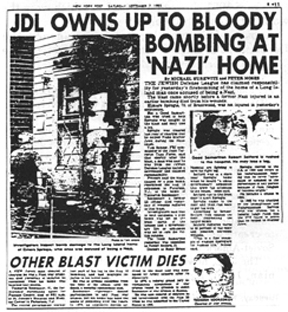
Jewish Defense League responsibility for a terrorist firebombing attack against an alleged "Nazi war criminal" is reported here in the New York Post, September 7, 1985.
- In 1975, 21-year-old JDL member David Kamaiko hijacked an executive helicopter in New York City, demanding $2 million ransom to buy guns for the JDL. Kamaiko shot the pilot before he was himself subdued. (note 40)
- In 1978, Canadian JDL leader Joseph Schachter bombed the home of right-wing activist Donald Andrews. (note 41)
- On April 11, 1982, JDL member Allan Goodman opened fire with a machine gun at a Muslim house of worship in Jerusalem, killing two Palestinian Arabs: an elderly man and a 20-year-old youth. After entering the mosque, he continued firing, critically wounding several people. Goodman, from Baltimore, Maryland, had received paramilitary training at the JDL's Camp Jedel in New York state. In an interview, Kahane said of the crime, "There was nothing wrong with what he did...the act was perfectly correct." (note 42)
- In 1987, three members of the Jewish Defense League were arrested for their involvement in at least six bombing attacks carried out the New York area between 1984 and 1987. The accused were Jay Cohen, Sharon Katz and Victor Vancier, head of the JDL in the New York area. After admitting his role in the terror bombings, Vancier was sentenced in October 1987 to ten years imprisonment. Another JDL member, Murray Young, was sentenced to five years in prison. (note 43)
- FBI officials believe that the JDL was behind the bomb blast in mid-August 1985 that killed Tscherim Soobzokov in Paterson, New Jersey, and a similar (although non-fatal) bombing attack in early September 1985 directed against Elmars Sprogis in Brentwood, New York. Soobzokov and Sprogis were falsely alleged to have been "Nazi war criminals." (note 44)
- In January 1991, Kurt Haber -- identified in newspaper reports as a "Jewish Holocaust survivor" -- was charged with making criminal threats against the Arab-American Anti-Discrimination Committee. (note 45)
Alex Odeh Murder
Perhaps the most widely-publicized crime in which the JDL has been implicated is the murder on October 11, 1985, of Alex Odeh, West Coast regional director of the American-Arab Anti-Discrimination Committee. Odeh was killed in a bomb blast when he entered his group's office in Santa Ana, southern California. (note 46)
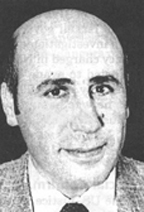 |
|
Alex Odeh
|
An FBI official announced in 1985 that the Jewish Defense League was believed responsible for the murder of Odeh and at least two other terrorist incidents on the East Coast. "We are attributing the three bombings to the JDL," said FBI official Lane Bonner. (note 47) Similarly, an FBI report released in July 1986 cited "elements" of the Jewish Defense League as responsible for the murder of Odeh. (note 48)
Three JDL members were identified by US federal investigators in 1988 as the perpetrators of the bombing that took Odeh's life. The accused assassins, who were born in the USA but fled to Israel to avoid punishment, are Keith Fuchs, Andy Green and Robert Manning. (note 49) Law enforcement officials in Los Angeles and New York have named Robert Manning -- an important Jewish Defense League activist -- as a suspect in at least four political bombings in 1985, including the one that killed Odeh. Manning, authorities said, had a two-decade history of violent activities that also included threats against producers of a television show. (note 50)
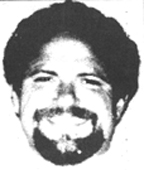 |
|
Robert Manning
|
After joining the southern California chapter of the Jewish Defense League as a charter member in 1971, Manning quickly earned a reputation as a particularly tough street fighter. JDL chief Irv Rubin praised him as a "pretty strong boy. I've seen him fight. We tangled with Nazis in the streets, Arabs in the streets. He was a real active guy." (note 51) In a 1988 court document, a federal prosecutor wrote: "It became known that [Manning], while purporting to act on behalf of the Jewish cause, on several occasions placed or threw explosive devices at locations of Arab antagonists." (note 52)
The Israeli government sought to obstruct the FBI's investigation of the Odeh slaying, the federal agency charged in November 1987. (note 53) Manning himself tried to evade extradition by claiming heart trouble, by taking 20 sleeping pills, and by charging that he was being wrongfully persecuted simply because he is a pious, orthodox Jew. In spite of all this, Manning was finally extradited to the United States in July 1993. (note 54)
Official Confirmation of JDL Terrorism
The US Justice Department's Federal Bureau of Investigation has repeatedly characterized the JDL as a terrorist and criminal organization. A report issued in 1985 by the FBI's Terrorist Research and Analytical Center confirmed: (note 55)
In FBI terrorism analyses published since 1981, responsibility for 18 terrorist incidents has been attributed to groups seeking to publicize past and present injustices suffered by the Jewish people. While claims for some of these acts have been made in the names of the "Jewish Defenders,' "United Jewish Underground," and "Jewish Direct Action," 15 of the incidents were attributed to the Jewish Defense League (JDL), by far the most well known of these groups.
Also in 1985, the FBI named the Jewish Defense League as the second most active terrorist group in the United States. (Only Puerto Rican terrorists were more active during this period.) The FBI linked the JDL to 37 terrorist attacks carried out from 1977 to 1984. (note 56) Two years later, the FBI announced that Jewish extremist groups had carried out 24 terrorist acts from 1981 through 1986, 17 of which were the work of the Jewish Defense League. (note 57)
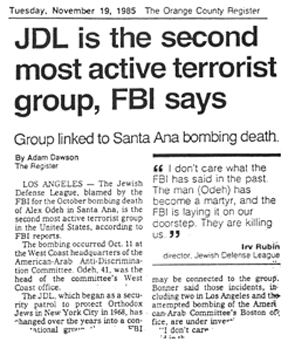 |
|
The Jewish Defense League was named in 1985 as a major terrorist group by the US Federal Bureau of Investigation, as a major California newspaper reports here.
|
Another US federal government agency, the Department of Energy, similarly characterized the JDL in a report issued in 1986: (note 58)
For more than a decade, the Jewish Defense League (JDL) has been one of the most active terrorist groups in the United States. Although the JDL maintains that it is a political action group concerned with dramatizing the plight of Soviet Jewry and, in more general terms, protecting Jews and Jewish interests worldwide, the FBI has long classified it as a terrorist organization.
...The underlying purpose of the JDL is to reverse the mythical image of the Jews as victims. This militancy also fuels the anti-Soviet campaign designed to create and foment new sources of tension in Soviet-American relations ...
The JDL, however, has also attacked Arab, Iranian, Iraqi, Egyptian, Palestinian, Lebanese, French, and German targets in the United States ... In 1978 [for example], Egyptian diplomats were targeted...Attacks have also been staged by League chapters in France, Britain, Italy and Israel.
In more recent years, the official report went on,
The JDL has pursued a dual-track strategy of acts of civil disobedience and generally peaceful protest, along with acts of outright terrorism...Bombing is the JDL's favorite tactic, accounting for 78 percent of all JDL incidents. Shootings are next, accounting for 16 percent, followed by arson, vandalism, and kidnaping, accounting for one percent each ...
Since 1968, JDL operations have killed seven persons and wounded at least 22...Sixty-two percent of all JDL attacks are directed against property; 30 percent against businesses; four percent against academics and academic institutions; and two percent against religious targets.
Typically, an anonymous caller will claim responsibility for a specific terrorist act for either the JDL or one of its alleged subgroups, only to have an official spokesman for the JDL deny the group's involvement the following day.
In the past, although the JDL was among the most active terrorist organizations in the United States, the threat it posed appeared to be primarily symbolic...Recent events, however, suggest that this view requires revision. The increase of militant Jewish terrorism represents not only an escalation of violence, but a significant change in targeting patterns, as well as a dramatic shift in tactics.
...The group appears to be concentrating its efforts on persons and institutions it considers to be enemies of Judaism and Israel. The targets now [1986] include alleged former Nazis and war criminals; Palestinian and Arab individuals and institutions; and persons and so-called research centers promoting views about the Holocaust that minimize the dimensions of Jewish suffering.
Perhaps the most far-reaching change, however, is the increasing use of assassination, both to draw attention to the terrorists' causes and to eliminate perceived enemies of the Jewish people and Israel.
Mordechai Levy and the Jewish Defense Organization
Besides Kahane, two of the most prominent JDL activists have been Irv Rubin and Mordechai Levy. Each has been repeatedly arrested for criminal activities.
Until 1982 or 1983, Mordechai (Mark) Levy was one of the most active of Jewish Defense League activists. (note 59) Among his numerous arrests was one in 1981 as a suspect in a car bombing. (note 60) On one occasion he dressed up in a full regalia Nazi uniform to apply for a parade permit to march at Independence Hall in Philadelphia, apparently in an effort to alert the local Jewish community to the "dangers of neo-Nazism." (note 61)
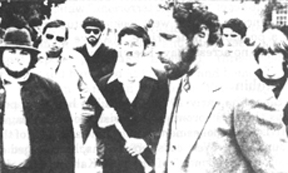 |
|
Irv Rubin with JDL followers at a 1981 gathering. Holding a baseball bat is Mordechai Levy. Rubin and Levy later became deadly rivals.
|
After leaving the JDL (supposedly because it was not "militant enough") he founded the Jewish Defense Organization. He claimed that his group, based in New York City, had more than 3,000 members. (The real figure was probably no more than a few dozen.) In the years that followed, Levy and rival Zionist militant Irv Rubin engaged in increasingly bitter feuding.
In August 1989, Levy was arrested following a dramatic night-time confrontation with Rubin and other JDL members. Fearing that Rubin was trying to kill him, Levy went to the roof of the building where he lived and began spraying the lower Manhattan street with semiautomatic rifle fire, wounding an air-conditioning repairman as he sat in his parked van. (note 62) Levy was later sentenced to four and a half years imprisonment for injuring the 69-year-old repairman. (note 63)
On April 22, 1993, Jewish Defense Organization members attacked demonstrators who had gathered in Washington, DC, to protest the US Holocaust Memorial Museum. At least one person was seriously injured. A JDO spokesman told reporters that several members of his group had attacked and beat "four or five" of the 150 or so persons who had rallied to express their opposition to the Museum. (note 64)
One of the victims was David Willcox, a 52-year-old employee of the Washington Suburban Sanitary Commission. He was standing on a street corner when three men wearing black "paramilitary" uniforms and skull caps with the Star of David attacked, beating him on the head and legs with metal pipes. Willcox required hospitalization and 12 stitches in his head.
Two JDO members later confirmed the attack against Willcox. JDO spokesman Michael Schneider told a reporter that his group would continue to do "whatever is necessary " to "defend" Jews, including attacking "enemies" in the street. The FBI said that it is investigating the attack against Willcox as a possible act of "domestic terrorism," while city police announced that they were looking into the incident as a possible "hate crime." (As we go to press, though, no arrests have been made.)
Irv Rubin
Since the early 1970s, Irv Rubin has been perhaps the most prominent Jewish Defense League activist and spokesman. After a time as leader of the group's JDL's West coast operations, he emerged as "national chairman" of the post-Kahane JDL. By 1979, Rubin had managed to get arrested 39 times in connection with JDL activities. (note 65)
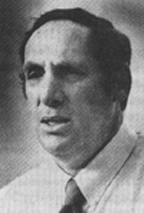 |
|
Irv Rubin
|
In March 1992, Irv Rubin was arrested on suspicion of conspiring to commit murder. He was released a few days later after the Los Angeles district attorney's office determined that police lacked sufficient evidence to hold him. (note 66)
In August 1992, Rubin's JDL succeeded in forcing a Los Angeles restaurant and nightclub, the Largo, to cancel a concert on behalf of the Palestine Aid Society, to raise money for humanitarian assistance. Rubin warned Largo proprietor Mark Flanagan that he could "expect trouble" and an "angry protest" unless he cancelled the event. Soon after, Flanagan discovered that his business' door locks had been destroyed by still-dripping fast-acting molecular glue. Then, just hours before the event was to begin, Flanagan canceled the concert out of fear that patrons might be victims of a possible JDL attack. (note 67)
Violence Against Holocaust Revisionists
Among the most persistent targets of Jewish terrorists in recent years have been those who reject the generally accepted Holocaust story that six million Jews were systematically murdered in Europe during the Second World War.
In recent decades, a growing number of scholars have been citing an impressive body of evidence that raises serious doubts about many supposedly well-documented aspects of the Holocaust story. These "Holocaust revisionists" include acclaimed best-selling British historian David Irving, French professor Dr. Robert Faurisson and Dr. Arthur Butz of Northwestern University. (For more about Holocaust revisionism and the arguments of revisionist historians, write for a catalog of books, tapes and other material from the Institute for Historical Review.)
Incidents of violence against revisionist "thought criminals" have included:
- George Ashley, a high school history teacher and supporter of the IHR, has been the target of several terrorist attacks because of his revisionist views. In April 1982, two bricks were hurled through the front window of his suburban Los Angeles home. One month later, two gasoline fire bombs were thrown against the front of his house, and in December of 1982, JDL criminals ransacked Ashley's home, causing an estimated $26,000 in damage. (note 68) Mordechai Levy later boasted: "We warned him [Ashley] that if he continued his activity, he would pay a consequence...We warned that if the school board does not stop Ashley, we would stop him." (note 69)
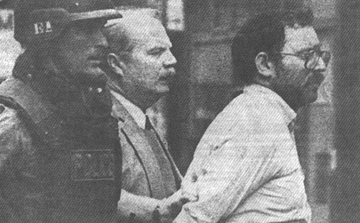 |
|
Mordechai Levy, leader of the militant Jewish Defense Organization, is taken into custody by police following an August 1989 shooting incident in which he wounded a bystander.
|
-
In July 1984, Ashley received repeated telephone calls from someone who threatened to bomb his home. A JDL member identified by police from tape-recordings of the threats was later arrested. (note 70) In August 1984, JDL member Michael S. Canale was arrested on suspicion of making a bomb threat against George Ashley. (note 71)
In May 1985, Ashley's home was the target of a another bomb attack, in which no one was hurt. The letters "JDL" were spray-painted on the walkway leading to Ashley's front door. (note 72) This attack was cited in a January 1986 federal government report: (note 73)
- The following month [May 1985], the JDL claimed credit for bombing the house of George Ashley, Los Angeles-area high school teacher who had told students that the number of Jews killed by the Nazis during World War II was considerably less than the commonly accepted figure of six million, and that not more than a million Jews perished during the war.
- Dr. Charles Weber, a contributor to the IHR's Journal of Historical Review, had his car vandalized in two separate incidents during the month of April 1985. A note from the JDL, which threatened to escalate the attacks into a bombing, was left behind in the second incident. (note 74)
- Dr. Reinhard K. Buchner, a professor of physics at California State University, Long Beach, and a member of the IHR Editorial Advisory Committee (1980-1983), was the victim of repeated JDL harassment in 1981, 1982 and early 1983. He was spat upon, physically attacked, threatened by phone, and harassed at his office and home. (note 75)
- German-Canadian publisher Ernst Zündel, a prominent revisionist activist, has been repeatedly attacked by the Jewish Defense League. In December 1983, JDL thugs beat him on the steps of Toronto's Old City Hall. The JDL carried out another attack against him on February 6, 1984.
In September 1984, Zündel's home in Toronto was damaged in a pipe-bomb attack. A group calling itself "The People's Liberation Army of the Jewish Defense League" claimed responsibility in a phone call to a local television station. In January 1985, a JDL mob attacked Zündel, his attorney Doug Christie and Christie's female legal secretary at the entrance to a Toronto courthouse. - The office of a German-American group was set on fire in 1985, apparently because of the organization's skepticism about Holocaust claims. According to a report on terrorism issued in January 1986 by the federal Department of Energy, in June 1985 (note 76), an anonymous caller stated that the JDL had intentionally set fire to the offices of the German-American Political Action Committee in Santa Monica, California. The German-American group probably incurred the JDL's wrath by its advocacy of the view that "Jews were not gassed by the Nazis...[and that] numbers and reports of predetermined extermination are greatly exaggerated by professional liars."
Target: Institute for Historical Review
Since its founding in 1978, the Institute for Historical Review has been the leading American publisher of books and other materials questioning the Holocaust extermination story. For this reason, its office in southern California, as well as individual IHR employees, soon became targets of a systematic campaign that included a drive-by shooting, three firebombings, vandalization of IHR employee-owned automobiles, slashings of 22 tires of employee automobiles, JDL-organized demonstrations outside the IHR office, and numerous telephone threats during office hours and at night to IHR employees at home. So intense did the harassment become that the family of one IHR employee was forced to move. (note 77)
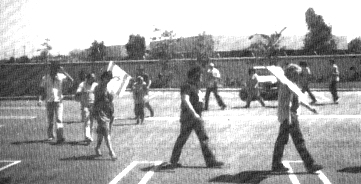 |
|
Jewish Defense League activists, one carrying an Israeli flag, shout slogans while marching outside the office of the Institute for Historical Review in Torrance, California, April 5, 1981.
|
During the course of a JDL demonstration in front of the IHR office on March 19, 1981, Mordechai Levy and other JDL protesters attacked the car of the landlord's agent, who had arrived to ensure security. While shouting threats, Levy smashed the right front passenger window of the man's car as he drove off. (note 78)
A few weeks later, on April 5, 1981, JDL hoodlums staged another violent demonstration outside the IHR office, during which an IHR employee was thrown to the ground and beaten.
In the early morning hours of June 25, 1981, came the first firebombing attack against the IHR office. Fortunately, the arson device -- similar to a "Molotov cocktail" -- caused only minor damage. A man claiming to represent the "Jewish Defenders" announced responsibility for the attack in phone calls to news agencies. (note 79)
The second arson attack against the IHR office came on April 25, 1982, in which a copy machine, a few pieces of furniture and some records were damaged. In a telephone message to a local news agency, a group calling itself "the Jewish Defenders" claimed responsibility. (note 80)
In an attack on September 5, 1982, the IHR office was riddled with gunfire, demolishing two windows and damaging the front door. Additionally, a small arson device caused some slight damage to the front of the office. Later that day, as throughout the week, came a barrage of murder-threatening telephone calls. Although the caller's voice was identified as that of Mordechai Levy, typically, no one was arrested in the case. (note 81)
Fire-Bombing Arson Attack
This terror campaign culminated in a devastating arson attack on the Institute's offices and warehouse in Torrance on July 4, 1984 -- the 209th anniversary of American independence. Damage in the attack, carried out in the early morning hours of the 4th, was estimated at $400,000. (note 82)
In a special edition of the IHR Newsletter (August 1984), IHR Director J. Marcellus summed up:
As a physical entity, the Institute for Historical Review has virtually ceased to exist. Ninety percent of our book and tape inventory -- the largest collection of revisionist historical literature to be found anywhere -- has been wiped out. Every last piece of office equipment and machinery -- including desks, chairs, files and shelves -- lay in charred heaps of useless, twisted scrap. Manuscripts, documents, artwork, galleys and film negatives -- products of more than six long years of a tough, dedicated effort to bring suppressed historical data to people the world over -- no longer exist. Tens of thousands of books...estimated at over $300,000 in value, are gone...More than 2,500 square feet of space that was once the world's most controversial publisher lies blackened in chaos and total ruin.
Two days later, JDL leader Irv Rubin showed up at the site of the gutted IHR offices to publicly praise the arson attack. The JDL, he declared, "wholeheartedly applauds the recent devastation of the offices of the Institute for Historical Review." Denying any personal responsibility himself, Rubin said that the criminal attack had been carried out by a former JDL activist named Larry Winston (Joel Cohen). "I believe, with all my heart, that he [Winston/Cohen] had something to do with this" arson, Rubin declared. (note 83)
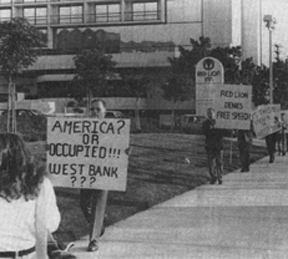 |
|
Some attendees of the 1989 IHR Conference demonstrate outside the Red Lion Inn Costa Mesa, California, to protest the hotel's capitulation to threat and intimidation by the Jewish Defense League.
|
Although no one was ever arrested in connection with the 1984 firebombing, the sophisticated nature of the attack suggests that it could have been the work of trained operatives of a foreign governmental agency.
Apart from local news coverage, American newspapers and television reported almost nothing about this act of criminal "book burning." This skewed media treatment moved noted journalist Alexander Cockburn to observe (in the pages of the liberal weekly The Nation): (note 84)
The outfit in the United States that does publish material belittling generally accepted accounts of the Nazi extermination of the Jews is called the Institute for Historical Review. I don't recall much fuss when its offices in Torrance, California, were firebombed in July 1984. Perhaps this is what Mailer meant by "sophistication" in handling such heterodox opinion.
At the same time, though, a few prominent voices courageously spoke out against the attack. American historian John Toland -- who received the Pulitzer prize for general non-fiction in 1971 for his book The Rising Sun -- wrote to the IHR: (note 85)
When I learned of the torching of the office-warehouse of the Institute for Historical Review, I was shocked. And when I heard no condemnation of this act of terrorism on television and read no protests in the editorial pages of our leading newspapers or from the halls of Academe, I was dismayed and incensed...I call on all true believers in democracy to join me in public denunciation of the recent burning of books in Torrance, California.
British historian David Irving, author of numerous acclaimed, best-selling works of history, declared: "I was deeply shocked to hear of the fire-bomb attack on your premises."
JDL Harassment of IHR Conference
In mid-February 1989, Jewish Defense League intimidation brought on the cancellation of a three-day Institute for Historical Review conference at two hotel sites in southern California.
Arrangements had been made months in advance to hold the Ninth IHR Conference at the Red Lion Inn hotel in Costa Mesa. Several days before it was to begin, the hotel received the first of a barrage of telephone threats warning that if it permitted the IHR gathering to take place as scheduled, there would be large, disruptive demonstrations in front of the hotel. It didn't take many such threats to persuade general manager Russell Cox to cave in to the Zionist group, and to cancel the hotel's contract with the IHR. Cox then added insult to injury by permitting JDL chief Rubin to hold a "news conference" in the hotel lobby.
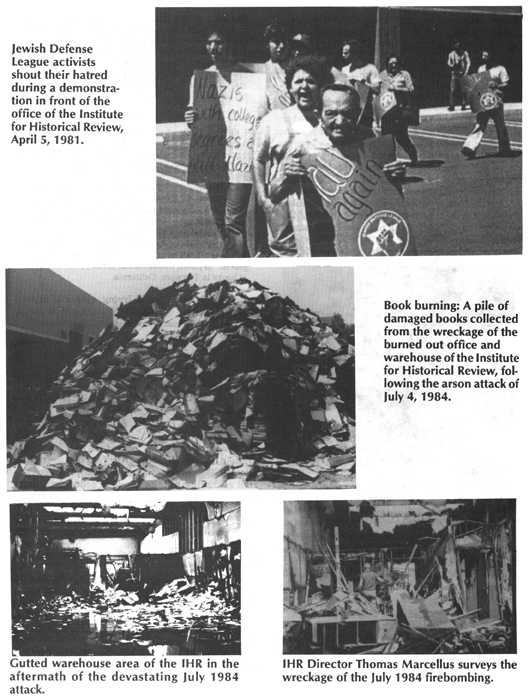 |
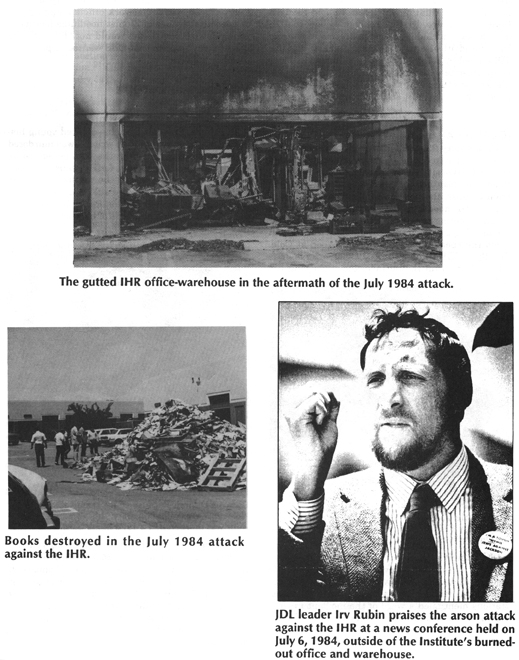 |
Arrangements were then hastily made to relocate the IHR gathering to a nearby Holiday Inn hotel. However, just hours before it was to commence -- and as attendees were arriving -- the Holiday Inn likewise cancelled out, bowing to JDL threats similar to those made against the Red Lion Inn.
At this point, and with help from former US Congressman John Schmitz, IHR Director J. Marcellus made emergency arrangements with Joe Bischof, proprietor of the "Old World Village" shopping center in Huntington Beach, to hold the IHR Conference there. Bischof refused to bow to JDL intimidation, including a demonstration at the site by a handful of sorry-looking placard-waving JDLers led by Rubin, who shouted insults at passersby. In spite of the disruption, and some inconvenience for attendees, the Ninth IHR Conference proved one of the most successful and high-spirited ever. (note 86)
JDL Thugs Attack Young Jewish Revisionist
On January 22, 1992, revisionist activist David Cole was attacked by JDL thugs at a meeting held at the University of California at Los Angeles. Before the meeting began, JDL leader Rubin first tried to push the youthful Cole down a flight of stairs. JDL hoodlums also harassed and pushed around meeting organizer Robert Morrissey. After the meeting commenced, JDL punks tried to shout down the speakers, and then threw food at Cole. Finally, a JDL thug assaulted Cole -- who is Jewish -- hitting him in the face and bloodying his nose. (note 87)
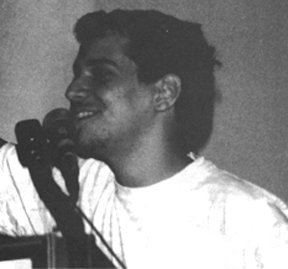 |
|
David Cole at the 1992 IHR Conference. He was attacked by JDL thugs at a meeting in January 1992 at the University of California at Los Angeles.
|
The tumult was recorded on videotape by a camera crew of the CBS television news program "48 Hours," as well as by news crews of two local Los Angeles television stations. Neither of the two local stations mentioned a word of the incident in their nightly news broadcasts. Similarly, CBS officials decided not to air even a second of this outburst, not even in a segment about Holocaust revisionism that was part of the CBS television network's hour-long magazine-format program "48 Hours" broadcast of February 26, 1992. Network officials apparently decided that scenes of Zionist hoodlums beating a young Jewish revisionist would not "fit" with the image of revisionism that CBS wanted to project to its many viewers. (note 88)
Violence in Europe
The Murder of François Duprat
In France, François Duprat -- a gifted young historian, educator, and prolific writer -- was murdered in 1978, thereby becoming the first person to be killed because of his support for Holocaust revisionism. Duprat had publicized the writings of former concentration camp inmate Paul Rassinier, distributed a booklet, Did Six Million Really Die?, and had published a revisionist article of his own, "The Mystery of the Gas Chambers." (note 89)
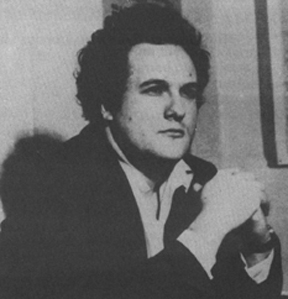 |
|
Francois Duprat. Because of his skeptical view of the Holocaust extermination story, this gifted French educator was murdered in a 1978 bomb blast.
|
As a result of such activism, the 38-year-old teacher was assassinated on March 18, 1978, when the car he was driving was blown up in a bomb blast. His wife, who was with him, lost the use of her legs in the attack. A Jewish "Remembrance Commando" and a "Jewish Revolutionary Group" promptly claimed responsibility for the murder. (note 90) So sophisticated was the attack that it is difficult to believe that no government agency was involved.
The Israel Connection
It is no secret that Israel provides training and weapons for local "Jewish defense groups" in the United States and many other countries. Victor Ostrovsky, a former intelligence case officer of the Mossad, Israel's spy and secret service agency, confirms this connection in his much-discussed book, By Way of Deception. (note 91) One department of the Mossad, writes Ostrovsky, is the Tsafririm, which is
responsible for setting up Jewish defense groups, called "frames," or misgerot, all over the world, now including some parts of the United States, where anti-Semitism is regarded as a threat ... The main job is to help the leaders of Jewish communities outside Israel plan for their own security. Part of this is done through the hets va-keshet, or "bow and arrow," Israel's paramilitary youth brigades.
... Often youths from other countries are brought over [to Israel] to spend the summer learning about security, picking up such skills as completing obstacle courses, pitching tents, and learning how to use a sniper rifle and Uzi assault rifle. Still others learn upgraded security skills, such as how to build a slick, for hiding weapons or documents, when and how to do security checks, as well as fundamentals of investigation and intelligence gathering.
Israel provides weapons for the many "Jewish defense groups," confirms Ostrovsky, indirectly through known arms dealers.
Tagar/Betar
In Europe the most important Zionist terrorist group is Tagar, the youth (or "student") branch of the radical Zionist movement Betar. The Tagar/Betar group has carried out numerous criminal attacks against "enemies," including Holocaust revisionists. Headquartered in Paris, Tagar/Betar has close ties with the Israeli government, and particularly with the political party of Begin and Shamir. Tagar is reportedly controlled by Israel's covert operations agency, the Mossad. (note 92)
Tagar activists have often boasted of their determination to "strike" against anyone who "denies the Holocaust." Tagar admitted responsibility for a physical assault against French revisionist historian Olivier Mathieu during a television interview in February 1990. Three months later, Tagar thugs sacked the "Ogmios" bookstore in Paris (which carried revisionist titles).
Tagar/Betar activists receive combat training along military lines from Israeli army officers. Tagar members wear paramilitary blue uniforms with white ties (the Zionist colors). Tagar/Betar has operated in Europe with the knowledge and approval of high French officials such as Prime Minister Laurent Fabius (who is Jewish). In more than one Tagar/Betar attack against opponents, French police have passively stood by. (note 93)
Tagar activists have operated in France under other names, including "Jewish Defense Organization" and "Jewish Combat Organization." Private para-military groups are strictly forbidden in France, except Jewish ones. Between June 1976 and April 1991, such Jewish "militias" have carried out 50 attacks. In effect, Jewish terrorists in Europe can attack their "enemies" with impunity. (note 94)
Tagar has also been active in the United States. In February 1992, the "Tagar Student Zionist Organization at the Ohio State University" in Columbus organized a protest meeting against Holocaust revisionism. The group distributed a leaflet -- which, typically, contained factual falsehoods -- specifically attacking revisionist activist Bradley Smith. (note 95)
Robert Faurisson
Dr. Robert Faurisson -- Europe's most prominent Holocaust revisionist (and a member of the Editorial Advisory Committee of the IHR's Journal of Historical Review) -- was severely injured in a nearly fatal attack on September 16, 1989. (note 96)
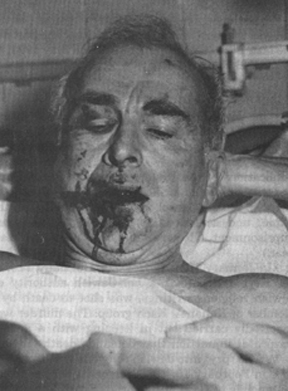 |
|
Robert Faurisson in a hospital bed following a nearly fatal attack by Zionist thugs on September 16, 1989.
|
After spraying a stinging gas into his face, temporarily blinding him, three assailants punched him to the ground and then repeatedly kicked him in the face and chest. The 60-year-old scholar, who had been out walking his poodle in a park in his home town of Vichy, suffered a broken jaw and severe head injuries. Physicians operated for four and a half hours to repair his jaw and treat a broken rib and badly swollen face.
A group calling itself "The Sons of the Memory of the Jews" claimed responsibility for the savage attack. In a statement, the group threatened: "Professor Faurisson is the first, but will not be the last. Let those who deny the Shoah [Holocaust] beware." (note 97) While French police officially would acknowledge only that "three young Jewish activists from Paris" had carried out the assault, the attackers are strongly suspected to have been with the Tagar/Betar organization. (note 98)
Prominent individuals and organizations in France, along with the country's most influential daily newspaper, Le Monde, condemned the attack. However, French-Jewish "Nazi hunter" Serge Klarsfeld sought to excuse or justify the crime. "Someone who has provoked the Jewish community for years should expect this sort of thing," he said. "One cannot insult the memory of the victims without inviting the consequences." (note 99)
While the September 1989 attack against Faurisson was the most vicious, it was neither the first nor the last. Between November 1978 and May 1993, he was attacked on ten separate occasions. (note 100)
Other Terrorist Incidents in Europe
- On November 5, 1980, an arson attack destroyed the office, warehouse and printing plant in Sussex, southern England, of the firm that prints Did Six Million Really Die? and other revisionist publications of the Historical Review Press. Damage was estimated at 50,000 pounds. A leftist journalist, Manny Carpel, was found guilty of the crime, and sentenced to two and a half years imprisonment. (He served only a little more than a year.)
- In January 1984, in Cologne, Germany, Professor Hermann Greive, a non-Jewish authority on Jewish religious writings, was shot to death by a member of Kahane's Kach group. The murder was reportedly carried out in keeping with a Jewish scriptural injunction that demands death for non-Jews who "pry" into Jewish religious writings. (note 101)
- On February 10, 1988, terrorists set fire to the automobile of German historian Ernst Nolte while it was parked at the Free University in Berlin, where he was a professor. An anonymous letter, signed with a five-pointed star, declared: "We attack Nolte because he is one of those who personally represents the continuity of fascism" and as co-founder of a "reactionary" group called the "Academic Freedom League." Nolte had been widely criticized for his moderately revisionist views of Second World War history. (note 102)
- On April 20, 1991, Betar/Tagar thugs carried out a violent attack against several persons who were to attend a conference in Paris on the French writer Marc Augier. (Under the pen name of Saint-Loup, Augier wrote a series of books on the French "Legion of Volunteers," which fought on the eastern front during the Second World War.) Three or four of the victims were hospitalized. One, a 67-year-old woman, was in a coma for two months. Two Tagar members were arrested in connection with the attack, but two and a half years later they had still not been brought to trial. (note 103)
- A bookstore in Paris had to be shut down for good in 1992 after repeated violent attacks by Jewish militants. The bookstore was targeted because it sold revisionist titles and was operated by revisionist publisher Pierre Guillaume.
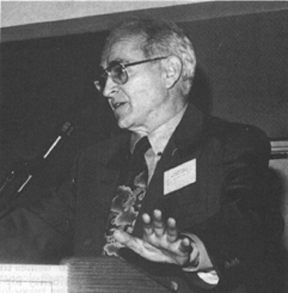 Dr. Faurisson speaking at the Tenth IHR Conference, October 1990.
Dr. Faurisson speaking at the Tenth IHR Conference, October 1990.
- On October 19, 1992, a team of about 30 Betar activists shoved and insulted pedestrians, smashed automobiles, and threw tear gas at police in the central plaza of the German city of Rostock. The group was led by the "Nazi-hunting" (and anti-revisionist) husband-wife team of Serge and Beate Klarsfeld. The Betar activists, some of them carrying Israeli flags, insulted passersby with shouts of "Dirty Germans! Dirty Nazis!". (note 104)
- In December 1992, the chief of the Jewish Defense League in Israel announced that he was sending teams of killers to Germany to murder "neo-Nazis." Every German who cries "Heil Hitler," or otherwise identifies himself as a Nazi, declared 33-year-old Rabbi Baruch Ben-Joseph (Baruch Green), is a target for death. (note 105) Prominent German far-right political figures are not the only persons on the Israel JDL's hit list, confided one JDL member: "Persons behind the scenes are often more important, such as the professor who denies or whitewashes the Holocaust in a book." (note 106)
Conclusion
As this report shows, non-governmental Zionist terrorism has been a problem for more than twenty years. It remains a serious problem today.
Espousing Jewish supremacy, the Zionist terrornetwork operates internationally, linking Israel, Europe and the United States. In addition to the suffering and destruction resulting directly from its many crimes, the network's campaign of bigotry fosters a dangerous climate of hate and intolerance. Through intimidation, threat and violence, Jewish-Zionist terrorists have succeeded in silencing numerous voices. Many others have never spoken up out of fear that they might likewise become victims.
Particularly alarming is the important support provided to these criminal groups by the government of Israel. This official collaboration poses a threat not only to the freedom and security of individuals in many countries, but to the very freedom and sovereignty of nations.
At the same time, though, the danger should not be exaggerated. Zionist power is formidable but not limitless.
For one thing, Jewish militants are often so inept and mutually suspicious that they squander much of their energy on attacks against each other. (note 107)
Moreover, the number of individuals and organizations that Zionist militants perceive as "anti-Semitic enemies" has increased so dramatically in recent years that any one person or group is less likely to be singled out for attack. (Even the much-feared "anti-Semite" epithet has lost much of its impact. In 1991, an Israeli government cabinet minister denounced President George Bush as "anti-Semitic" because he wasn't acting quickly enough in approving a $10 billion loan guarantee to Israel.)
The readiness of Zionist militants to use violence against those whose views they reject is an implicit admission of moral and intellectual weakness. By resorting to violence against Holocaust revisionists and others, Zionist fanatics inherently acknowledge their inability to discredit their adversaries' arguments in free and open debate. Each new act of intimidation and violence only serves to further underscore this intellectual impotence.
In the long run, ideas and arguments cannot be destroyed by violence. Holocaust revisionism, in particular, has made such strides in so many countries in recent years that it can no longer be effectively suppressed.
Notes
- Probably the most useful books about Kahane and the JDL are: The False Prophet: Rabbi Meir Kahane: From FBI Informant to Knesst Member (Chicago: Lawrence Hill Books, 1990) by American Jewish journalist Robert I. Friedman; and, Heil Kahane (New York: Adama, 1986), by Israeli investigative journalist Yair Kotler
- . Avishai Margalit, "The Violent Life of Yitzhak Shamir," The New York Review of Books, May 14, 1992, pp. 18-24.; Lenni Brenner, Zionism in the Age of the Dictators (1983), pp. 266-269.; L. Brenner, Jews in America Today (Lyle Stuart, 1986), pp. 175-177.; Sol Stern, L. Rapoport, "Israel's Man of the Shadows," Village Voice (New York), July 3, 1984, pp. 13 ff.; Israel Shahak, "Yitzhak Shamir, Then and Now," Middle East Policy, Vol. 1, No. 1, 1992.
- R. Friedman, The False Prophet (1990), pp. 4, 61-63, 68, 78, 82.
- Yair Kotler, Heil Kahane, pp. 27-29.; R. Friedman, The False Prophet, pp. 71-75.; J. Kifner, "Meir Kahane," The New York Times, Nov. 6, 1990, p. B 13.
- R. Friedman, The False Prophet, pp. 85-98.
- R. Friedman, The False Prophet, pp. 87, 105-108.
- Y. Kotler, Heil Kahane (1986), pp. 46-51.; R. Friedman, The False Prophet, pp. 121-127.
- Geoffrey Wigoder, Dictionary of Jewish Biography (New York : Simon & Schuster, 1991), p. 250.
- "JDL is the second most active terrorist group, FBI says," Orange County Register (Santa Ana), Nov. 19, 1985.; Robert I. Friedman, "Nice Jewish Boys with Bombs: The Return of the JDL," Village Voice (New York), May 6, 1986, pp. 21, 22.
- New York Times, Nov. 6, 1990, pp. A1, B13.
- Y. Kotler, Heil Kahane (1986), pp. 184-185.
- M. Kahane, "Vengeance," The Jewish Press (Brooklyn, NY), June 13, 1980, pp. 36D, 46.
- The Jewish Press (Brooklyn), Nov. 9, 1973.
- Jewish Press (Brooklyn), Oct. 1, 1982. Quoted in: Lenni Brenner, Jews in America Today (1986), p. 297.
- Quoted in: J. Kifner, "Meir Kahane," New York Times, Nov. 6, 1990, p. B 13.
- Quoted in: B. Lynfield, "Meir Kahane: The Battle Ahead," Midstream, February 1986, p. 18.
- Meir Kahane, The Story of the Jewish Defense League (1975), p. 5. Quoted in: G. Cromer, "Negotiating the Meaning of the Holocaust," Holocaust and Genocide Studies (Britain), Vol. 2, No. 2, 1987, p. 290.
- M. Kahane, Our Challenge: The Chosen Land (1974), p. 137. Quoted in: G. Cromer, "Negotiating the Meaning of the Holocaust," Holocaust and Genocide Studies (Britain), Vol. 2, No. 2, 1987, p. 291.
- R. Friedman, False Prophet, p. 1.
- J. Kifner, "Meir Kahane," New York Times, Nov. 6, 1990, p. B 13.
- The Washington Post, August 27, 1985.
- Y. Kotler, Heil Kahane, p. 195.
- Y. Kotler, Heil Kahane (1986), pp. 153, 198-212.; See also: Gerald Cromer, "Negotiating the Meaning of the Holocaust," Holocaust and Genocide Studies (Britain), Vol. 2, No. 2, 1987, pp. 292-294.
- See: Lenni Brenner, Jews in America Today (1986), p. 298.
- See, for example: Genesis 28:1, 6; Deuteronomy 7:1-3; Leviticus 20: 2, 26; Ezra 9:1-2, 12; Nehemiah 13: 23-30.
- L. Brenner, Jews in America Today (Secaucus, N.J.: Lyle Stuart, 1986), p. 301.
- R. Friedman, False Prophet, pp. 115-116, 222-224.; R. Friedman, "Inside the Jewish Terrorist Underground: In the Realm of Perfect Faith," Village Voice, Nov. 12, 1985, p. 19. ("Among the wealthy Jews who have supported the JDL, is Reuben Mattus, the founder and president of Häagen-Dazs ice cream.")
- Evening Star (Washington, DC), March 1, 1971.
- R. Friedman, False Prophet, pp. 222, 269-271.
- R. Friedman, "Nice Jewish Boys with Bombs: The Return of the JDL," Village Voice (New York), May 6, 1986, p. 26.
- R. Friedman, The False Prophet, p. 147.
- R. Friedman, The False Prophet, pp. 125, 185.
- Y. Kotler, Heil Kahane, p. 33.; R. Friedman, False Prophet, pp. 64, 76, 77, 85, 86.
- See, for example, Kahane's essay, "The 'Guilt' of Jews Threatens Israel," in the New York Times of April 7, 1989.; Kahane's essay "Is Israel's Soul Imperiled? Yes, by Liberal Jews," appeared in the The New York Times of Dec. 20, 1985. Quoted in: L. Brenner, Jews in America Today, pp. 297, 320, n. 25.; Kahane's essay, "Enough Lamentation," apparently appeared in the New York Times of November 2, 1972. Source: The Jewish Defense League: A Cult of Racism and Terror, and a Threat to Arab-Americans, ADC Issues [report] No. 9, published by the American-Arab Anti-Discrimination Committee, Washington, DC (1982?).
- Y. Kotler, Heil Kahane, pp. 10-11.
- R. Friedman, The False Prophet, pp. 142-145.; The Jewish Defense League: A Cult of Racism and Terror, and a Threat to Arab-Americans, ADC Issues [report] No. 9, published by the American-Arab Anti-Discrimination Committee, Washington, DC (1982?).
- Los Angeles Times, May 9, 1972, p. 5.
- Alfred M. Lilienthal, The Zionist Connection (1979), p. 395.
- R. Friedman, False Prophet, pp. 178-180.
- The Jewish Defense League: A Cult of Racism and Terror, and a Threat to Arab-Americans, ADC Issues [report] No. 9, published by the American-Arab Anti-Discrimination Committee, Washington, DC (1982?).
- Vancouver Sun, July 3, 1978.
- Washington Post, April 12, 1982.; Village Voice, Oct. 2, 1984.
- H. W. French, "3 J.D.L. Members Seized in Bombings," New York Times, May 9, 1987.; L. Buder, "Prison for Ex-J.D.L. Chief in Bombing," New York Times, Oct. 27, 1987, p. B3.
- D. Palermo, "FBI Links JDL to Bomb Death of Arab Leader," Los Angeles Times, Nov. 9, 1985.; A. Dawson, "Terrorism experts puzzled by FBI's finding," Orange County Register (Santa Ana), Nov. 13, 1985, pp. B1, B6.; See also: Robert I. Friedman, "Nice Jewish Boys with Bombs: The Return of the JDL," Village Voice (New York), May 6, 1986, p. 24.
- K. Reich, "Holocaust Survivor Arrested After Alleged Threats," Los Angeles Times, Jan. 30, 1991.
- D. Palermo, "FBI Links JDL to Bomb Death of Arab Leader," Los Angeles Times, Nov. 9, 1985.
- D. Palermo, "FBI Links JDL to Bomb Death of Arab Leader," Los Angeles Times, Nov. 9, 1985.
- D. Palermo, "FBI Report Links 'Elements' of JDL...," Los Angeles Times, July 3, 1986.; See also: L. Sasaki, "FBI Attributes Fatal Bombing in Santa Ana to 'Extremists'," Los Angeles Times, July 17, 1986.; S. Engelberg, "Official Says F.B.I. Has Suspects in Blasts Laid to Extremist Jews," New York Times, July 17, 1986.
- R. Friedman, False Prophet, pp. 239 ff., and 248.; R. Friedman, "Did This Man Kill Alex Odeh?," Village Voice, July 12, 1988, pp. 19-21.
- K. Reich, "Mail-Bomb Suspect Sent Back to U.S.," Los Angeles Times, July 19, 1993.
- G. Dillow, "Mail-Bombing Suspect a Man of Many Faces," Los Angeles Times, August 5, 1993.; K. Reich, "Mail-Bomb Suspect Sent Back to U.S.," Los Angeles Times, July 19, 1993.
- "Mail-Bombing Suspect...," Los Angeles Times, Aug. 5, 1993.
- "FBI Memo: Israelis Hampering Probe," The Washington Post, Nov. 19, 1987, p. A 19.; "FBI Memos Accuse Israel...," Los Angeles Times (Orange County ed.), Nov. 19, 1987, p. II/1.;
The Manning case was the subject of two revealing articles in the influential Jewish community weekly Jewish Press (Brooklyn), July 5, 1991. The first, "Israel's Chief Rabbinate: Torah Law Forbids Extradition of Mannings" (p. 2), reported that leading Israeli rabbis had declared that the extradition of Robert Manning and his wife from Israel to the United States would be a violation of Jewish "Torah Law," or Halacha. The article went on: "Rabbi Shaul Yisraeli, a prominent member of the Chief Rabbinate, said that he always had opposed the extradition agreement Israel has with other countries because it is contrary to Torah Law." The second article, "More On the Mannings: What the Feds Are Really After" (p. 56C), related: "The [Jewish] Shulchan Aruch and the Rambam state explicitly that it is absolutely forbidden to send a Jew into the hands of a Gentile. In the words of the Rambam, 'It is forbidden to send a Jew into the hands of the Gentile, be it his money or his body...one who does so has no portion in the World to Come'." - K. Reich, "Mail-Bomb Suspect Sent Back to U.S.," Los Angeles Times, July 19, 1993.; M. Parks & E. Malnic, "Israel Orders Murder Suspect Returned to L.A. for Trial," Los Angeles Times, August 17, 1993.
One condition for Manning's extradition to the US was that he would not be charged or prosecuted for his role in the Odeh killing. In October 1993, a federal jury in Los Angeles found Robert Manning guilty of complicity in the 1980 bomb death of a secretary at a computer company, 32-year-old Patricia Wilkerson. See: "Ex-JDL Activist Guilty of Bomb Death," Los Angeles Times (Orange County edition), Oct. 15, 1993, pp. A1, A12. - US Dept. of Justice, Federal Bureau of Investigation, Terrorist Research and Analytical Center, Terrorism Section, Criminal Investigative Division, FBI Analysis of Terrorist Incidents and Terrorist-Related Activities in the United States (1985), pp. 16-18. Quoted in: Issa Nakhleh, ed., Encyclopedia of the Palestine Problem (New York: Intercontinental Books, 1991), Vol. II, pp. 862, 867.
- "JDL is the second most active terrorist group, FBI says," Orange County Register (Santa Ana), Nov. 19, 1985.
- "FBI Memo: Israelis Hampering Probe," The Washington Post, Nov. 19, 1987, p. A 19.
- US Dept. of Energy, Terrorism in the United States and the Potential Threat to Nuclear Facilities (R-3351-Doe, January 1986), pp. 11-16. Quoted in: Issa Nakhleh, ed., Encyclopedia of the Palestine Problem (New York: Intercontinental Books, 1991), Vol. II, pp. 862-864, 867-68.
An analyst for the Rand Corporation confirmed in 1984 that the Jewish group pursues "a dual-track strategy alternating between civil disobedience and generally peaceful protest to vandalism and outright acts of terrorism." (Source: "JDL is the second most active terrorist group, FBI says," Orange County Register [Santa Ana], Nov. 19, 1985.) - R. Friedman, False Prophet, pp. 232-233.
- "JDL wasn't militant enough for Levy," New York Post, August 11, 1989, p. 5.
- R. Friedman, "Oy Vey, Make My Day," Village Voice, August 22, 1989, p. 15.
- New York Daily News, August 11, 1989, pp. 1, 4, 5.; New York Post, Aug. 11, 1989, pp. 1, 5.; See also: "Man Charged in Bleecker Street Sniping," New York Times, Aug. 11, 1989, p. B3.; R. Friedman, "Oy Vey, Make My Day," Village Voice, August 22, 1989, pp. 15 ff.
- "Jewish militant gets 4 1/2 yrs. in shooting," New York Post, April 12, 1990 (?).
- L. Goodstein, "Holocaust Museum Protester Later Beaten," The Washington Post, April 29, pp. C1, C2.; L. Kellman, "Hate crimes follow opening of museum," The Washington Times, April 24, 1993, p. A 11.; L. Kellman, "Beating outrages Jews: The Washington Times, April 29, pp. B1, B2.; The Washington Report on Middle East Affairs, June 1993, pp. 50, 51, 108.; For more on the April 22, 1993, demonstration, see: The Journal of Historical Review, July-August 1993, pp. 2-3, 17.; The New York Times informed readers that "attempts were made to interrupt the [Holocaust] museum's dedication on April 22." (NY York Times, "Book Review" section, July 11, p. 1.) This is not true. The demonstration, which took place under police supervision some distance from the dedication ceremony site, was entirely peaceable. The only "interruption" connected with the day's events was violence committed against peaceful demonstrators.
- The Jewish Defense League, ADC Issues [report] No. 9, published by the American-Arab Anti-Discrimination Committee, Washington, DC (1982?).
- "JDL Chairman Rubin Released in Murder Case," Los Angeles Times, March 11, 1992.
- P. M. Twair, "Freedom of Speech Only a Memory in Gang-Ridden Los Angeles," The Washington Report on Middle East Affairs, October 1992, pp. 55, 85.
- IHR Newsletter, June 1985, p. 10.
- Daily News (Los Angeles), Dec. 9, 1982, p. 10.
- Daily Breeze (Torrance), Sept. 1, 1984.
- R. Varenchik, "Man who calls Holocaust a lie reports threat; JDL figure held," Los Angeles Daily News, Aug. 21, 1984, pp. 1, 8.
- A. Jalon, "Bomb Hits Home of Holocaust Doubter," Los Angeles Times, May 16, 1985.
- US Dept. of Energy, Terrorism in the United States and the Potential Threat to Nuclear Facilities, R-3351-Doe, January 1986, pp. 11-16. Quoted in: Issa Nakhleh, ed., Encyclopedia of the Palestine Problem (New York: Intercontinental Books, 1991), Vol. II, pp. 862-864, 867-68.
- Tulsa Tribune, April 12, 1985, and information from Dr. Weber.
- IHR Newsletter, June 1981, p. 4.; IHR Newsletter, May 1983, p. 6.; Information from J. Marcellus.
- Source: US Dept. of Energy, Terrorism in the United States and the Potential Threat to Nuclear Facilities, R-3351-Doe, January 1986, pp. 11-16. Quoted in: Issa Nakhleh, ed., Encyclopedia of the Palestine Problem (New York: Intercontinental Books, 1991), Vol. II, pp. 862-864, 867-68.
- IHR Newsletter, August 1984.; Letter by IHR Director Marcellus to US Senator Jeremiah Denton, July 20, 1984.; Information provided by Marcellus.
- Daily Breeze (Torrance), March 20, 1981, p. 1.; Information provided by J. Marcellus.
- "Terror Comes to the IHR," IHR Newsletter, July 1981, p. 2.
- "Arsonists hit Institute for Historical Review office," Daily Breeze (Torrance), July 5, 1984, p. A3.; IHR 1982 Annual Report [IHR Newsletter], December 1982, p. 2.
- "Nazi Holocaust Doubters Target of Jewish Group," Los Angeles Times, August 1, 1985, p. B 1.; IHR 1982 Annual Report [IHR Newsletter], December 1982, p. 2.; Information provided by J. Marcellus.
- "Arsonists hit Institute for Historical Review office," Daily Breeze (Torrance), July 5, 1984, p. A3.
- "JDL applauds blaze at Torrance institute," Daily Breeze (Torrance), July 7, 1984, pp. Al, A6.; In the wake of the fire-bombing, the IHR started up again from a makeshift new office in Torrance. In 1985, Rubin announced a JDL campaign to force the IHR out of the city. ("Nazi Holocaust Doubters Target of Jewish Group," Los Angeles Times, Aug. 1, 1985, p. B 1.)
- A. Cockburn, "Beat the Devil," The Nation, March 20, 1989, p. 366.
- The statements of Toland and Irving appear in the IHR Newsletter, October 1984, p. 1.
- IHR Newsletter, April 1989.
- IHR Newsletter, February 1992, p. 5.; IHR Newsletter, April 1992, p. 1.
- In 1992, Cole conducted a videotaped interview with the curator of the Auschwitz State Museum. A VHS videotape cassette, "David Cole Interviews Dr. Franciszek Piper," is available from the IHR for $49, plus $2.50 shipping.
- Philip Rees, Biographical Dictionary of the Extreme Right Since 1890 (New York: Simon & Schuster, 1990), pp. 106-107.; R. Faurisson, The Journal of Historical Review (IHR), Winter 1988-89, pp. 417 f.
- Le Monde (Paris), March 19-20, 1978, p. 24, and March 23, 1978, p. 7. See also: "Quinze ans de terrorisme," ("Fifteen years of terrorism"), Le Choc du Mois (France), June 1991, p. 7.; M. Weber, The Journal of Historical Review, Summer 1988, pp. 180, 184.
- Victor Ostrovksy and Claire Hoy, By Way of Deception (New York: St. Martin's Press, 1990), pp. 291-292.
- R. Hemeçaix, "Bétar: la mauvaise étoile de David" ("Betar: The evil star of David"), Le Choc du Mois (France), July-August 1990, pp. 37-38.; See also: "Quinze ans de terrorisme," Le Choc du Mois (France), June 1991, pp. 7-13.
- R. Hemeçaix, "Bétar: la mauvaise étoile de David," Le Choc du Mois (France), July-August 1990, pp. 37-38.
- Le Monde, March 7, 1986, p. 8.; "Quinze ans de terrorisme" ("Fifteen years of terrorism"), Le Choc du Mois (France), June 1991, pp. 7-13.; "Ces milices juives qui sèment la terreur" ("Those Jewish militias that sow terror"), Le Choc du Mois, April 1992, pp. 37-39.; R. Hemeçaix, "Bétar: la mauvaise étoile de David," Le Choc du Mois (France), July-August 1990, pp. 37-38.;
See also: "Une communauté otage de ses extrémiste," Le Choc du Mois (France), June 1991, pp. 14-17.; "Carpentras: L'effet Boomerang," (France), June 1991, pp. 18-20.; F. Chesnay, "Toute censure est un aveu," Le Choc du Mois (France), June 1991, pp. 21-22; D. Barney, C. Champetier & C. Lavirose, La nouvelle Inquisition: Essai sur le terrorisme intellectuel et la police de la pensée (Paris: 1993). - A copy of a leaflet issued in Feb. 1992 by the "Tagar Student Zionist Organization at the Ohio State University" (Columbus) is on file at the IHR.
- "L'agression contre M. Robert Faurisson revendiquée par 'Les fils de la mémoire juive'," Le Monde, Sept. 19, 1989, p. 14.; Sunday Telegraph (London), Sept. 24, 1989.; "Historian severely beaten for disputing Holocaust," Reuters dispatch, Philadelphia Inquirer, Sept. 18, 1989.; IHR Newsletter, October 1989.; M. Weber, Christian News (New Haven, Mo.), Oct. 16, 1989, p. 22.
- Le Monde, Sept. 19, 1989, p. 14.; Sunday Telegraph (London), Sept. 24, 1989.; Christian News (New Haven, Mo.), Oct. 16, 1989, p. 22.
- Letters by R. Faurisson to the IHR of June 16, 1992, October 24, 1992, May 28, 1993, and September 14, 1993.
- Le Monde, Sept. 19, 1989, p. 14.; Sunday Telegraph (London), Sept. 24, 1989.; Christian News (New Haven, Mo.), Oct. 16, 1989, p. 22.
- Letters by R. Faurisson to the IHR of July 15, 1993, September 14, 1993 and Nov. 27, 1993.;
In Stockholm, Faurisson has been attacked twice. The first attack, on March 17, 1992, was reported widely in the Swedish press. The second attack, on May 22, 1993, also received coverage in Swedish newspapers.; The attack against Faurisson in Paris on May 30, 1993, was reported in: "Faurisson, incident au cours de la Réunion de la Tribune des athées," Libération, (Paris), June 1, 1993. - Le Figaro (Paris), January 26, 1984, p. 4.
- "Attack Against Auto of German 'Revisionist' Historian," IHR Newsletter, July 1988, p. 5.
- "Un commando sioniste s'invite au meeting néo-nazi," Libération, April 22, 1991, p. 28.; "Ces milices juives qui sèment la terreur," Le Choc du Mois (France), April 1992, pp. 37-39.
- H. de Bresson, "L'équipée sauvage du Bétar à Rostock," Le Monde (Paris), Oct. 21, 1992, p. 4.
- "Extremisten aus Israel: Jagd auf Neonazis in Deutschland?," Berliner Morgenpost, December 11 [or 12?], 1992.; Frankfurter Allgemeine Zeitung, Dec. 12, 1992, p. 6.
- Michael Kneissler, "Tod den Nazis," Playboy (Deutschland), February 1993 (2/93), pp. 47-54.
- R. Friedman, "Nice Jewish Boys with Bombs: The Return of the JDL," Village Voice (New York), May 6, 1986, p. 21 ("... Members spend more time plotting against each other than against their gentile enemies.")
THE ZIONIST TERROR NETWORK: Background and Operations of the Jewish Defense League and other Criminal Zionist Groups
Completely revised 1993 edition
Prepared by Mark Weber
ISBN 0-939484-22-6
Copyright (c) 1985, 1993 by the
Institute for Historical Review
P.O. Box 2739
Newport Beach, CA 92659
USA
You may also read a review of this title.
Main | Leaflets | Journal | Books | Contact us | Search | Support IHR | Subscribe |

